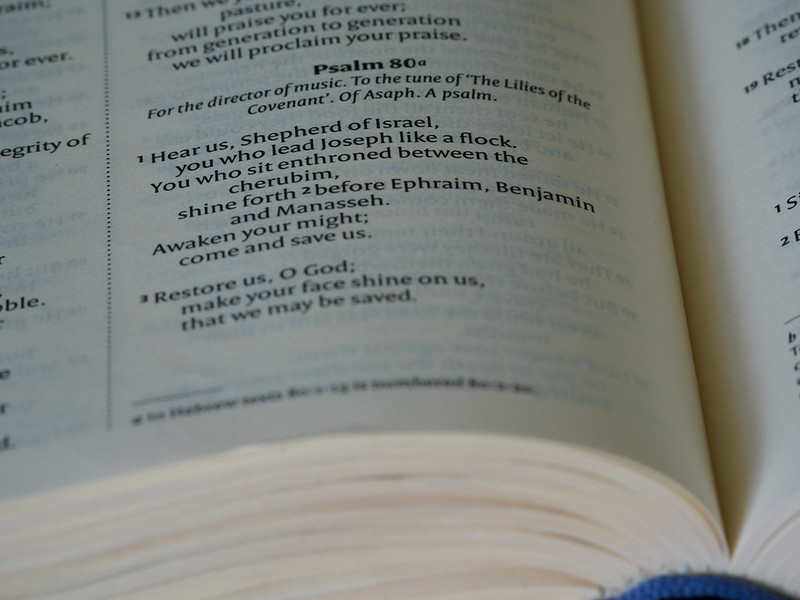START WITH SCRIPTURE:
Psalm 98
CLICK HERE TO READ SCRIPTURE ON BIBLEGATEWAY.COM
OBSERVE:
This is a song of praise to the Creator and Savior of the world. Not only are the human worshippers called upon to praise the Lord using every means available, but even nature itself is summoned to glorify God.
The motivation for this praise is revealed in all the marvelous things that God has done:
His right hand, and his holy arm, have worked salvation for him.
Yahweh has made known his salvation.
He has openly shown his righteousness in the sight of the nations.
He has remembered his loving kindness and his faithfulness toward the house of Israel.
Not only has this salvation been made manifest for the nations (i.e., non-Israelite Gentiles), and to Israel — all creation has experienced the salvation of God.
And every available means of music-making and celebration are to be used in this chorus of praise — shouting, jubilant song and music, the harp, trumpets, the ram’s horn. Even nature itself joins in this mighty song:
Let the sea roar with its fullness;
the world, and those who dwell therein.
Let the rivers clap their hands.
Let the mountains sing for joy together.
We note that the ram’s horn was blown to herald important feast days and holy days in the liturgical year of the Israelites. This is a particularly special time of worship.
And what is the occasion of all this joy and jubilation? Yes, they are celebrating the salvation that God has worked by creating the world and delivering his people; but the Psalmist especially draws attention to the righteousness of God, and his impending judgment of all the world:
he comes to judge the earth.
He will judge the world with righteousness,
and the peoples with equity.
APPLY:
How are we to respond to the magnificence of creation, the salvation of all the earth, and the justice that God brings in his judgments? With all the earth, we join together in a chorus of praise.
The image that seems to fit here is that of a full symphony and a massive choir, with every instrument and voice joining together in harmony to praise God!
And there is in this also a cautionary note — this Psalm is not anthropocentric. The Psalmist is not setting humankind in the epicenter; even creation is a part of this vast harmony of praise. No, the one at the center of all of this praise is the Lord of all creation.
In a way, this Psalm is a reminder to us that we are not saved merely individualistically. We are part of the vast and complex network of God’s creativity. As Paul says in Romans 8: 19-21:
For the creation waits with eager expectation for the children of God to be revealed. For the creation was subjected to vanity, not of its own will, but because of him who subjected it, in hope that the creation itself also will be delivered from the bondage of decay into the liberty of the glory of the children of God.
This is why we Christians cannot divorce ourselves from concerns and interests in the world around us — the economic, environmental and, yes, even political systems in which we live and work and even worship. God’s ultimate goal is to redeem, deliver and liberate his entire creation from its bondage to decay. And that is worthy of our worship!
RESPOND:
When I read this Psalm, I am reminded of recent hikes in a state park, with the bluest of skies and the greenest of trees, and the occasional snort of a deer nearby, or the hoot of an owl.
I am reminded when I walk through that cathedral that all creation will unite to praise the Creator, and the day is coming when:
at the name of Jesus every knee should bow, of those in heaven, those on earth, and those under the earth, and that every tongue should confess that Jesus Christ is Lord, to the glory of God the Father (Philippians 2:10-11).
Judgment won’t be merely a sifting of good and evil (although there is that too), but a restoration of what was meant to be.
So I respond to my Creator and Savior with unceasing praise, together with angels and archangels, and with oceans and mountains and rivers!
Lord, how can I not praise you when I consider the contrasts of delicacy in a wildflower, and the magnificence of a mountain? How can I not praise you for your mercy revealed in Jesus, who though God became man to bring my nature together with yours, thus cleansing me of all unrighteousness? How can I not praise you that you will bring justice to a broken and sinful world, and finally make it all right? Amen!
PHOTOS:
"Lectionary visual reflection based on Psalm 98.7" by Baptist Union of Great Britain is licensed under a Creative Commons Attribution-NonCommercial-NoDerivs 2.0 Generic license.







